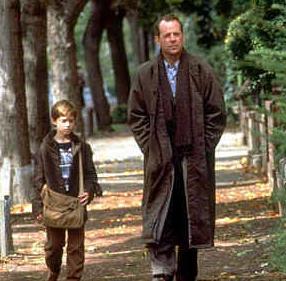As one of those folks who writes about movies on a regular basis, I’m faced with a challenge. I have to explain why a movie is good without actually revealing the major plot points or talking about the ending. Alternatively, I can throw in a sentence explaining that there will be “spoilers” in the article. (There will be spoilers aplenty in this one)
The whole practice is ridiculous, and I’ve always been of the opinion that if knowing the end of a movie will ruin it, then it wasn’t a good movie to begin with.
Let’s take an example, or say, 100 examples. I think we can all agree that the AFI “100 Years… 100 Movies” list is a pretty good indicator of film quality. You or I may disagree on a particular film or two, but generally, it’s a good list. Every movie on that list is ‘spoiler proof.’ You could, and probably do, know the end to every single one of them and they’d still hold up as cinematic masterpieces.
 And there are a few films with surprising plot points on the list. ‘Psycho’ is a great example. You know, the whole Norman Bates/mother thing. But that’s the point, isn’t it? You know already, and you probably knew before seeing the movie. I did. It didn’t make ‘Psycho’ any less enthralling.
And there are a few films with surprising plot points on the list. ‘Psycho’ is a great example. You know, the whole Norman Bates/mother thing. But that’s the point, isn’t it? You know already, and you probably knew before seeing the movie. I did. It didn’t make ‘Psycho’ any less enthralling.
Not to go down the Hitchcock route again, but ‘Rear Window’ is another great film with a big surprise. If you haven’t seen the movie, you’re still probably familiar with one of the many parodies and homages, including an episode of ‘The Simpsons.’ It’s not the ending that makes the movie great, it’s the buildup to the ending and the clean execution.
How about ‘Empire Strikes Back’ for a change of  pace. There’s no question that the secret of Luke’s father was a big deal for people that experienced it for the first time, but I was born in 1982, which means I’ve known Vader was Luke’s dad ever since I can remember. The surprise isn’t what made the scene powerful.
pace. There’s no question that the secret of Luke’s father was a big deal for people that experienced it for the first time, but I was born in 1982, which means I’ve known Vader was Luke’s dad ever since I can remember. The surprise isn’t what made the scene powerful.
M. Night Shyamalan built his career on the surprise ending, and look where that’s gotten him. ‘The Sixth Sense’ holds up nicely, and it’s actually more interesting once you know that Bruce Willis is actually dead. His other movies, like ‘The Village,’ ‘Signs,’ and ‘The Happening’ don’t hold up. The twist ending isn’t what makes the film.
I could go on with other examples of classic works that we love but already know the ending to. Okay, one more. ‘Romeo and Juliet.’ We know what’s going to happen, but we want to see how. Each retelling brings something new to the table, but the ending, and the entire script, stays the same.
And for movies without twist endings, why does it even matter? Is there a chance that Tony Stark won’t emerge victorious at the end of ‘Iron Man’? Are we really astounded by the complex ending of ‘Talladega Nights: The Ballad of Ricky Bobby’? Does anyone really think ‘Toy Story 3’ will end on a sad note?
So let’s agree that the spoiler alert is unnecessary and that movies aren’t about the destination, but about the journey. If not, can we at least agree that you shouldn’t be reading movie reviews if you don’t want to know anything about the movie?






JoeRo
I agree with you that people who whine about spoilers shouldn’t be reading reviews online, or at the very least should keep their bad attitude to themselves, but I disagree on your other points. For me, knowing the end of the movie beforehand diminishes the experience. But that’s me, and that’s MY experience. Your experience is obviously different. One of the things that motivates me to keep reading any text, in any medium, is experiencing the wholeness of it. In the case of film, a mostly linear form of storytelling, the end becomes very important. There are a great number of films out there that have truly shocking endings, endings that change your entire perception of the film. But that change is often critical to the experience, and while I don’t believe that “spoiling” an ending makes a movie unwatchable, it can steal the impact that ending would otherwise have for the viewer.
Jane Morgan
Spoilers and moneyshots are the reason I no longer watch movie trailers or read reviews.
I’ve been going into movies naked for three years. I find it a more fulfilling experience.
The only parts of reviews I look at is overall metacritic score, overall box office take, and top ten lists, so I know what to netflix.
And I check HDD’s blu-ray video review scores, so if I’m iffy on a film, the transfer quality rating will push me toward a watch or a pass.
Spoiler-free is the way to be!
MarioCMS
I think you got it all wrong. A good movie is a good movie, OK. But a spoiler won’t affect the quality of the movie, but the quality of the watching experience.
Of course you should care about spoilers because then you won’t enjoy watching a movie (specially one you don’t know the story beforehand) as much as you would enjoy it if the plot twists surprised you.
If you already know the story and someone spoils it, it’s not a spoiler, and the enjoying will depend on if it’s a good movie or not, but if you don’t know the story and someone spoils it, it will make it less enjoyable, even if it’s a good movie.
Scott Dye
If I remember correctly, movie reviews in the past (like when I was growing up and before the internet) were often used to help people decide IF they wanted to see a movie. They did not contain spoilers, and just told if it was good or not, in general terms.
Now, on the internet, that seems to want to be changing. Now it’s more about a reviewer showing off their skills at having an opinion about a movie, and how people comment on that opinion. The reviewer now would rather be the first commenter.
Scott Dye
Also, you logic seems to be flawed. It’s really easy to say “look at all these old classic movies, that are beyond the reasonable timeframe to prevent general knowledge of the endings – and compare that to why I want to be able to spoil current movies”
They aren’t the same.
Dick Ward
AuthorI think the word ‘spoil’ makes the argument look bad 🙂
I think it’s perfectly reasonable to want to talk about an entire movie. If the ending to a movie was particularly bad or particularly good, or worthy of mentioning it seems silly that, at least on the internet, I can’t talk about it without having to write *spoiler alert* at the top of the article.
Dick Ward
AuthorOn that note, it works both ways. I would also rather read full reviews that don’t leave out plot details if they’re deemed important to the review, and articles that fully explain what they’re talking about instead of dancing around it.
Scott Dye
I understand both points. That’s why putting a spoiler alert – which is apparently such a chore to do – let’s readers on both sides of the opinion know that you are wanting to talk about the entire movie, so they can avoid it if that is there preference.
I understand you want to talk about the ending. That’s fine. Just throw a bone to those of us that want to learn something about the quality of a movie, without knowing the “meat” of it.
Having to put in one extra line in your review that mentions spoilers isn’t really that hard is it? Really? There are a lot of things I really don’t want to do in life, but are very simple ways to be polite to others.
EM
I agree with JoeRo about the “wholeness” of the experience of watching the movie. I would add that often, there is a context surrounding the first viewing that can contribute strongly to the enjoyment of the unfolding of the film. Unlike Dick, I was around to watch the original “Star Wars” trilogy when the films first played. The advent of each movie was a cultural event, and Vader’s claim of paternity was far more than just a plot twist. For three years it was discussed and debated (had Vader lied? had Ben lied? etc.) until “Return of the Jedi” finally came along. Now, I have seen “The Empire Strikes Back” numerous times, and of course Vader’s claim doesn’t surprise me anymore—I still find the film very enjoyable with merits far beyond any shock value. But there’s no time quite like the first time.
Joe B
Sorry, but I ouldn’t disagree more!
Spoilers ruin movies!!
I was an older teen when PSYCHO came out and it would have been no fun for us by tattling twits who just can’t wait to reveal the secret!! Today, I read NO reviews before seeing a film — but, for particular writers, I do note opening and closing paragraphs simply to see whether or not the scribe likes the film. Then I enjoy checking out the writers’ reactions after the fact.
Of course, many of the long, long trailers in the theatre simply show so many highlights of the (usually flashy and worthless) film– letting you “see it” without paying another admission price!! To illustrate, I point to trailers for the ridiculous (“National Treasure 1”) to the would-be-but-ain’t sublime (the ludicrously overrated “Cold Mountain”). Both trailers had the most interesting parts of two not-so-great films. Would I had realized I’d seen the “good parts” and saved the admission for both.
And, yes! A film can be a really good one without allowing the kiddies to figure it out. “What’s gonna happen, Daddy?”
Give me a break!!
Watch “Witness for the Prosecution” (mid-1950s.) And DON’T read anything about it first!
Vince Masten
I am a spoiler-phobe for one simple reason: I love surprises. Is my movie experience ruined by knowing the ending or a major twist in the middle? No, probably not, but that doesn’t take away from the fact that I would enjoy that ending or twist more had I not known about it. I am so committed to this ideology that I’ve stopped reading the backs of books (which usually give away a solid third of the plot if not more) and I won’t even want to know the sex of my own children ahead of time. I’d just rather find out in one glorious adrenaline-filled moment. What makes your opinion on spoilers any more or less valid than mine?
Andy Gilleand
I don’t read spoilers, don’t watch trailers, don’t read what the cast is, or even read what the basic story is for any movie I know for certain I will watch, this is particularly true for sequels, such as Toy Story 3. I have not watched any trailers, teasers, tv spots, I don’t know what happens in the story. I’ve found that the less you know about a movie, the more you will enjoy it.
For example ***IRON MAN 1 SPOILERS*** when Sam Jackson shows up after the credits in Iron Man, I was very pleasantly surprised, not knowing he was going to be in the film at all *** END SPOILERS***
To me, spoilers aren’t only major plot twists, but any piece of information about a film or tv show you might not have known before. Casting, Characters, even costume (for superheros) as well as the most basic plot points can all be considered spoilers.
Some of the best movie experiences I’ve ever had are when I knew absolutely nothing about the movie (even basic concept) and was simply recommended by a friend to see. I started avoiding spoilers when I spoiled every single bit of Star Wars Episode 3 and knew everything that was happening next, it just was much more boring than it would have been if I hadn’t known. Sure, I still enjoyed the film, but I would have enjoyed it so much more had I not known every detail.
Andy Gilleand
Also, I don’t read reviews because they can influence whether you think a movie is going to be good or not. Without reading reviews, I can go into a film with a neutral and unbiased attitude toward the movie, and therefore enjoy it for what I think of it, rather than just going along with someone else’s thoughts or being influenced by them.
Josh Zyber
Ah, but this is a two-way street. If someone HADN’T spoiled the Sam Jackson appearance at the end of Iron Man, most viewers would not have stayed through the end credits to see it. You may be one of the few people who do sit through all the credits, but that’s very rare. Especially for summer tentpole movies like Iron Man, which typically have about 10 solid minutes of VFX credits.
I understand your point about some movies being more enjoyable if you know absolutely nothing about them. I recommend the movie ‘Stander’ starring Thomas Jane for this. (It’s on DVD, but not yet Blu-ray.) Don’t read a review. Don’t read a plot synopsis. Don’t even read the back of the disc case. The best way to experience this movie is to know nothing at all about it beforehand.
Of course, how is a studio supposed to market that? In the case of ‘Stander’, they couldn’t. It never made it beyond limited release.
EM
“If someone HADN’T spoiled the Sam Jackson appearance at the end of Iron Man, most viewers would not have stayed through the end credits to see it.”
I stayed through the end credits to see the Samuel L. Jackson appearance because I had read about it on the Internet…but I didn’t know it was a Samuel L. Jackson appearance, because the mention didn’t spill the details—it just indicated there was something worth seeing after the credits. No spoilers necessary.
AlbertX
Wrong!!! I watched Sixth Sense and I knew the ending, for me that was the worst thing ever, since I will never figure it out if I would have discovered about it or not.
So I saw the whole movie knowing it was kind of frustrating, the movie was still great yes, but I dont know if I would have been surprised or said this is stupid or whatever.
The movie will still be good but the experience of watching it will be not.
Titanic yes I knew the ship will sink, but I didnt know everything that happened during, if someone told me more about the movie it would have not been the same.
Think about memento for example or Fight Club, do you think it is the same thing to watch them knowing?
Andy Gilleand
Well the Titnic movie isn’t really about the ship sinking, that’s just something that happens in the movie. The movie is more about the characters.
Michael Palmer
Hey Dick. I think your argument that ‘spoilers’ don’t ruin great movies is spot on. Amazing movies will always be good on repeat viewings, and it’s almost impossible to see all the old and modern greats without important details, which have permeated culture for years or even decades, already being known.
However, this is almost tangential to what spoilers themselves do. Check out J.J. Abrams “mystery box” speech that he gave at TED, as he goes into much more detail, but reviewers (especially of new releases) or marketing departments should never disclose key plot twists. Not because the movie will float or sink due to the revelations, but you may be robbing audiences of an *experience* which can never be replicated. “The first time.” There is nothing like the initial viewing of a great movie (and the less known about it the better, because it adds to the magic). Sure, repeat viewings lead to a deeper, more mature appreciation, but the emotional ride is never quite as pure. And, as a reviewer seeing films early, no one tinkered with how you experienced the film (again, this mostly applies to new releases).
Obviously there’s no way to make a blanket ”rule,” as you and others have cited tragedies like Romeo & Juliet and Titanic, for properly disclosing information. Key plot elements can be known about certain stories well in advance, but the point of a tragedy (or any story for that matter) isn’t the “what happens” but the “how they get there.” And in my humble opinion, spoilers kill not only the “what”, but sadly the “how,” which can most purely be experienced on an initial viewing.
Cheers.
EM
Dick, I wonder if the problem here is a blurring of categories of film discussion and criticism. I’m on board with Scott Dye’s description of movie reviews as being an aid in deciding whether to see a film or not. Generally, people trying to make that decision do not want all the details laid out.
Now, if you want to pen an in-depth analysis of Freudianism in Hitchcock’s “Psycho”, fine—but a movie review is probably not the place. That’s not to say one cannot allude to such concerns in a review, but deeper analysis probably belongs in an essay whose audience is composed of persons who have already seen the film and persons who have not but understand that the film is going to be discussed in greater detail than is usually found in a review.
Blu-ray and DVD reviews make things more complicated. Generally, we think of movie reviews as treating movies currently or imminently playing in theaters; such movies are usually brand-new, and so it’s expected that the target audience of the review has not seen the movie.
However, with Blu-ray and DVD reviews, I think you get more of a mix: much of the readership *has* seen the program content before and already likes it and is curious specifically about its handling on disc—but there’s also a large segment of the audience that still hasn’t seen the content before and is looking for the same kind of information that a movie review is supposed to provide. I know that when I look at disc reviews, I frequently belong to both groups—which one I belong to simply depends on which disc’s review I’m looking at.
(Sometimes there are other reasons for reading disc reviews, but I suspect the above are the usual reasons.)
I imagine that for disc reviewers, the temptation to discuss spoilerish details is frequently greater than for theatrical-release reviewers; as wonderful as the picture, sound, and extras for the Blu-ray disc of “The Wizard of Oz”, “The African Queen”, “Snow White and the Seven Dwarfs”, etc. might be, reviewers of such discs have often built up a wealth of knowledge and opinions about those movies long before the discs were even pressed, and the disc review is a wonderful opportunity to unleash one’s inner critic.
I suppose one one-size-fits-all solution for disc reviews would be to keep the spoilerific discussion in a separate, clearly marked section that the spoiler-wary reader can easily skip—or to keep it on a separate page altogether, possibly linking to it from the review. Maybe there are better solutions.
coologuy1957
Great idea! If you split the review among the regular review and a spoiler-filled review that could be pretty cool. People would have the option and you could discuss the more in depth themes and stuff like you mentioned in the original article. But always err on the side of not spoiling something….
Josh Zyber
I can see both sides of this debate. On the one hand, I strongly believe that movie reviews should be more than just a simple Thumbs Up/Thumbs Down, “Should you go see this movie?” recommendation. The best reviews attempt to actually analyze and discuss the plot and themes of the film. And, in many cases, it may be necessary to discuss a “spoiler” if it’s central to the critic’s opinion of the movie.
For example, I recently reviewed Minority Report on Blu-ray. In my opinion, the movie is pretty great, until the last half hour, where it completely falls apart. There’s no way to explain why I feel that way without revealing some plot information. The review would be incomplete without discussing that.
To EM’s point about a movie review being an inappropriate place for “deeper analysis,” if not there, then where? There are very few outlets for film analysis essays, outside of college term papers or Cahiers du Cinema. To ghettoize deeper discussion of film to those limited venues is essentially to say that filmmaking as an art form is no longer worth thinking critically about or discussing.
With that said, I think the critic needs to be making an important point with it if he’s going to reveal spoilers. He shouldn’t include spoilers just to do so.
If there’s one thing I can’t stand in this world, it’s a “review” that is nothing more than an extended point-by-point plot synopsis. (Like the writings of a certain “Doctor” on a competing web site that shall remain nameless.)
The details of the way a movie’s story plays out are best discovered by the audience while watching. The review should give a broad overview, and then focus on those specifics that actually color the critic’s opinion of the film.
EM
“To EM’s point about a movie review being an inappropriate place for ‘deeper analysis,‘ if not there, then where? There are very few outlets for film analysis essays, outside of college term papers or Cahiers du Cinema.”
Um…why not pages on Web sites, like this one?!?
coologuy1957
No, I’m sorry but you are just wrong. Don’t spoil anything for anyone. Its called a “spoiler” for a reason, and whether or not the ending is subpar, amazing, or a complete shock, something is lost when you know what happens. And the same goes for trailers and reviews. If you don’t want to know, don’t watch or read them! It is possible. There are so many review sites now and multiple trailers per movie, but you still have to go to the sites – you still have to seek them out! You can change your channel on the TV. This site is especially good about not spoiling anything or I would have never come back (or would simply just read the a/v reviews). I agree that the ending does not really make or break any movie, but in many cases it will ruin the experience. If all of the tension revolves around trying to figure out whats happening and you go in knowing what happens, then, yes, there is much lost. Yes, movies like Top Gun and Iron Man there is no surprise, but you still don’t know how the events play out. Heck, you are kind of wrong about Iron Man because ***SPOILER ALERT*** when RDJ said “I am Iron Man” that was a shock and a surprise! Yes, Iron Man was triumphant in his battle, but no one could see that reveal coming and it added great impact to the ending. I have read many Marvel comics and as far as I know, Tony Stark always does everything he can to deny being Iron Man, so, yes, even for comic books fans that revelation was a shock and pretty cool.
EM
Actually, in comics, Stark publicly revealed his dual identity about eight years ago (real time).
(Perhaps knowing that before seeing the movie would have constituted a spoiler for you. 😉 )
coologuy1957
I was referring to the canon of the original Iron Man in his first few years where he is constantly denying that he is Iron Man and utilizing remote drones to fly the suit to prove or use Rhodey in the same way….
According to wiki, the reveal happened “In Iron Man (vol. 3) #55 (July 2002), Stark publicly reveals his dual identity as Iron Man.”
Considering Iron Man debuted in 1963, there was 39 years before the reveal story arc in 2002. So yes, by any means, it was a surprise for them to use that arc in the first movie.
Zaserov
“If knowing the end of a movie will ruin it, then it wasn’t a good movie to begin with.”
I think that making a generalization like this kind ignores an important distinction between movies for fun and movies as something more meaningful (art or self-reflection or what have you). Movies vs Films, for shorthand. I can agree with the sentiment for Film – no lasting classic will have to depend on plot twists, else they wouldn’t be worth watching a second time.
On the other hand, going into a Movie which is based around the plot twist is completely undermined by knowing what happens. If a viewer already knows it was the Col. Mustard, then when Prof. Plum and Ms. Scarlet are hiding from one another there’s no longer any tension (did I just use a Clue metaphor?). Nobody intends to watch the Movie a second time, unless it has other unexpected redeeming features – it’s just a 2 hour diversion that involves trying to figure out who’s the puppy killer.
So the point would be that if someone is reviewing a Film – especially one past the statute of limitations for spoilers – then likely knowing every plot point won’t detract, and may even add to the experience if one knows what to look for that makes it a classic. But, since so much of what’s available is just throw-away entertainment, spoilers take away from the fun.
tl,dr version: Spoilers don’t harm a GREAT movie, but can significantly detract from everything else. So just use the tags, whiner.
Neil
I see it as two separate things. I can certainly enjoy a good movie when I know the ending, otherwise, I’d never watch a film a second time. But there’s a different type of enjoyment that comes from not knowing what’s going to happen. So you’re getting the 2nd kind of enjoyment, and totally missing that first kind of enjoyment. To each their own, I like to experience both types of enjoyment myself 🙂
Just a thought
Excellent argument, Mr. Blogger.
Now let’s all ditch our blu-rays and HDTVs to go watch Casablanca on VHS because, heck, it’s such a good movie we can still enjoy it anyway.
Dick Ward
… isn’t it? 🙂
Me
BS. Spoilers can ruin good films. Get with reality.
FreddyC
While I agree with the premised that an unspoiled ending doesn’t necessarily make for a good movie, I believe it’s more interesting to go into a film with limited knowledge.
I did that with “Signs” and had a great experience. I literally didn’t know anything about it, other than crop circles were appearing and Mel Gibson was in it. It was fun to have to think along with the movie.
Now, I still think it’s a good film and have watched it several times since, but there was something about that first time, in the theater, with little clue on what was happening. In a world that rarely surprises us anymore it was welcomed by me.
Freddy
CREAM OF SUM YUN GAI
You really don’t get it Dick we read reviews online to get an example of how the movie turned out not to have it spoiled for us. The only time it’s necessary is when it’s a movie like Norbit, or Catwoman, or even The Happening.
Lepton
A movie with a surprise ending makes the second watching a very different experience. Why miss out on the bargain?